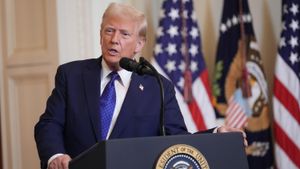Germany finds itself at the center of intense political debate following the recent Bundestag vote on stricter migration policies, which has sparked controversy over the collaboration between the Union and the far-right Alternative for Germany (AfD). Friedrich Merz, the Union leader, has defended this contentious partnership, asserting the importance of addressing migration issues head-on.
On January 30, 2025, the Bundestag voted on the proposed five-point plan aimed at tightening Germany's migration policies, prompting reactions from across the political spectrum. Among the proposed measures are continuous border controls and the rejection of all illegal attempts to enter the country, which many perceive as echoing the AfD’s long-standing demands.
According to recent polls conducted by YouGov, up to 80% of Germans support the controversial proposal to deny migrants at the border outright, reflecting a significant shift in public opinion concerning migration. This overwhelming statistic underlines the growing sentiment among citizens who feel increasingly frustrated with the EU's migration framework.
Merz maintained his position on the Bundestag floor, stating, "That it is okay to have protests and objections shows the nature of democracy." He faced backlash, particularly from within his party, where many protested the Parliament's inclination to align with AfD positions. Dobrindt, the CSU group leader, swiftly rebutted claims of the Union adopting AfD policies, describing them as nonsense.
Despite the criticism, Merz emphasized the need for action. At a campaign rally, he boldly asserted, "I don’t want to depend on the AfD to bring our proposals to the Bundestag… We have to address immigration and migration issues independently.” This defiance earned applause from supporters; yet, it left many questioning the ethical boundaries of collaborating with the far-right party.
Adding complexity to the discourse, former Chancellor Angela Merkel criticized Merz's strategy, reminding him of his previous stances against forming alliances with the AfD. She pointed to his November speech, where he vowed not to form majorities based on AfD votes. Yet, the Union's decision to collaborate with the AfD on migration policy leads one to ponder whether those younger, more progressive ideas hold any weight as they have, historically, shaped German politics.
Political analysts have cited this as both strategic maneuvering and as potential recklessness on Merz's part. The division within the Union, as well as its growing ideological alignment with the AfD, has raised alarms about the future of centrist politics. Analysts have previously warned of the dangers tied to blending traditional conservative values with the far-right agenda, as they could alienate moderate voters they once considered steadfast supporters.
The proposed plan aims for long-lasting changes, calling for the continuous checks on the German borders and the mandatory detention of individuals subject to deportation. These sweeping measures go beyond what has typically been acceptable for the Union party, highlighting increased pressure to cater to voter sentiment amid rising migration numbers. The political backdrop reflects both regional frustrations with migration policy and national unrest—an unstable mix sought after by populist parties like the AfD.
Despite the seeming successes of the compact strategies adopted by Merz and his party, questions linger around the future viability and human consequences of these policies. How will collaborations with parties perceived as extreme affect the Union's identity, especially as Germany approaches the Bundestags elections?
With growing fears about illegal immigration and mounting calls for stricter policy, the Union is facing unprecedented scrutiny. Observers note the dangers of how fringe parties can influence mainstream parties when migration fears run high. The challenge for Merz and the Union will be to proceed without losing the core centrist values, which many believe are fundamental to Germany’s political fabric.
Both Merz and the Union look to counterbalance their engagements with the AfD. Yet, as described by analysts, it is evident the migration subject has become volatile enough to fracture alliances and shift party dynamics significantly. The true impact of this shift will be tested as Germany navigates its way toward the 2025 elections, where the role of the AfD, and its alarming rise, will be pivotal.



